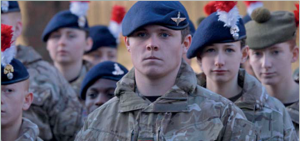Cadet units are youth groups funded and supported by the Ministry of Defence. Community Cadet units are either Army, Sea or Air Training cadets. The school-based Combined Cadet Force contain one or more sections from the Navy, Marines, Army or RAF.
A young person can join the cadets aged 12, although Sea cadets can join as young as 10 years old. The units are run by adult volunteers who may or may not have a military background.
Combined Cadet Forces (CCF) have traditionally operated in private schools. As part of the government promotion of ‘military ethos’ in schools, the Cadet Expansion Programme was launched in 2012 to establish 100 new cadet units in state secondary schools in England.
In 2015, the government announced a further £50 million for expansion to 500 cadet units in state schools by 2020, specifically targeting areas of economic deprivation.
A number of state schools in Scotland have a ‘linked detachment programme’ which is run in partnership with the Army Cadet Force. The Scottish government maintains that this cadet model contributes to the curriculum and is therefore different to cadet units in England.
“We are committing £50 million to expand the number of cadet units in our state schools to 500, prioritising less affluent areas.”
George Osborne, then Chancellor of the Exchequer, July 2015
What’s the problem?
The cadets are an effective tool to influence young people and build public support for the military. They normalise the use of weapons and provide a direct pathway to recruitment for some.
The Ministry of Defence has said the cadets are not about recruiting into the armed forces but has also called the cadets, “a powerful tool for facilitating recruitment”.1 The MoD is keen that the cadets are seen primarily as a youth organisation and this is facilitated by presenting the cadets as addressing wider government concerns around attainment in schools, character development and social mobility.
The importance of cadet units for recruitment is evident most recently in the 2017 report to the prime minister, ‘Filling the Ranks’, which recommends that the Cadet Expansion Programme is extended, and that more information is given to cadets to encourage them to enlist.
Cadet activities may provide positive experiences for some, but they do so within a narrow, military framework, which will not appeal to many. Expansion of cadets comes at a time when other youth work has experienced huge cuts.
With fun and adventurous activities, a risk-laden career is made to seem enjoyable and exciting. There is also substantial evidence of bullying in the cadets.
While schools are ultimately responsible for safeguarding and investigating concerns in the CCF, Community Cadets utilise the armed forces chain of command structure for investigating allegations. This can lead to mishandling of cases and cover ups.2
“Bullying and ‘hazing’ were fairly institutionalised within the CCF particularly during camps.”
Former cadet
Answering questions
The cadets are a youth organisation – it’s not about recruitment.
The MoD present the cadets as primarily a youth organisation for the development of young people but they would not invest so much time and money into them if it did not have a value to defence interests.
Don’t the cadets benefit young people who join them?
Being in the cadets may benefit young people, but so too would any well-funded youth programme. Opportunities are biased towards military activities at the expense of universal provision. Isn’t it just a bit of fun? Activities involving the military can be fun and alluring to children and young people but that doesn’t mean that they are appropriate in the education system. The reality is that war is always damaging to those directly involved and should not be trivialised or glamorised.
It doesn’t do you any harm does it?
For many, the cadets is not a safe environment. As well as routine low-level bullying and humiliation, hundreds of serious historical and current sexual abuse allegations have recently come to light. Dozens of of instructors have been dismissed and over £2 million paid out by the Ministry of Defence in settlements.2
But it’s not about war and violence is it?
Many cadet activities ape warfare, with the use of guns, simulated enemy fire and war games. Combining these experiences with fun and excitement and young people’s desire to succeed makes war seem normal.
Cadet membership In 2017, there were 84,000 Community Cadets and 42,000 cadets in Combined Cadet Forces units (2).
1. See Ministry of Defence, 2005. Strategy for Delivery of MOD Youth Initiatives
2. MOD Sponsored Cadet Forces Statistics 2017


